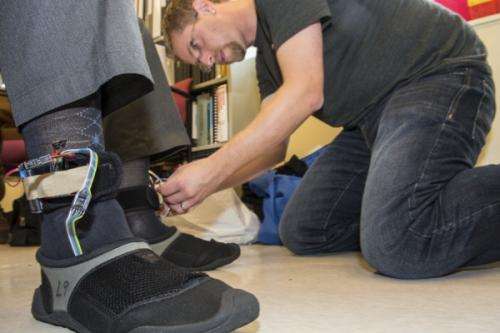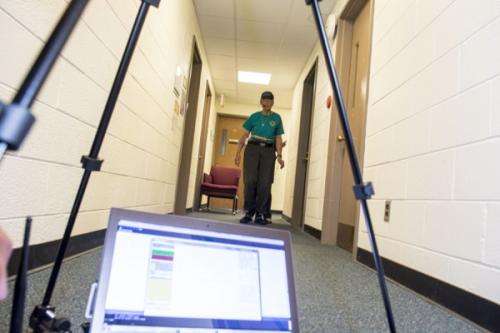Lending a helping foot: UD Parkinson's study brings subject from California to Delaware

Jack Brill is determined to walk, but Parkinson's disease causes his feet to "freeze" when he tries to move forward.
Brill has figuratively worn many hats in his 81 years of life—engineer, author, financial consultant—but now he literally sports one that says, "I believe in dreams."
The dream he believed in was to participate in the University of Delaware PDShoe project, which is led by Ingrid Pretzer-Aboff, associate professor in the School of Nursing.
The PDShoe is an ordinary beach shoe equipped with force sensors and a simple vibration system. The vibration in the robotic shoe is synchronized to the heel strike and toe-off of the person wearing it, so it delivers a vibration every time the foot strikes the ground.
The results of pilot studies conducted over the past two years indicate that the shoe shows promise for managing freezing of gait, known as FOG.
Brill wanted to participate, but he and his wife live 3,000 miles away, in San Luis Obispo, Calif., and the trip to Delaware would be expensive.
That's when the Dream Foundation stepped in and provided the couple with plane tickets and some extra cash to offset the costs of their weeklong stay on the East Coast. The non-profit organization "makes dreams come true for adults facing life-threatening illness."

Brill learned of the UD study from Carol Walton, executive director of the Parkinson Alliance, a national organization that raises funds to help finance the most promising research to find the cause and cure for Parkinson's disease.
"When Jack heard about the study, he insisted on participating," says Sandy, his wife of 61 years. "And when he makes up his mind, nothing is going to stop him."
She warned her husband that Pretzer-Aboff was conducting research, not offering treatment. "You're not going to come home with the shoe," she said.
"I know," he replied. "But if I can help by being part of the study, I want to do it."
Pretzer-Aboff has been actively involved in improving the lives of those with Parkinson's disease for more than a decade through her research and her work with support groups and caregivers.
"People like the Brills continue to amaze and inspire me," she says. "Although Jack participated in the study with little expectation of long-term benefit, I got an email from his wife shortly after they returned home indicating that she really thinks the shoe was helpful to him."
Two days later, Pretzer-Aboff received an email from Jack himself. He wrote, "'It's like a miracle. It is possible my dream of walking again will become reality. The last two days I have been able to walk using only the walker."
The message, which also included some details about his physical therapy and his use of a metronome as a prompt, was signed, "Peacefully, the walking Jack."

















